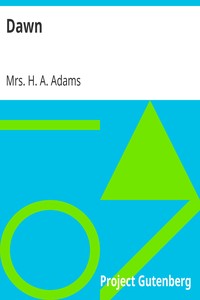Dawn by Mrs. H. A. Adams
"Dawn" by Mrs. H. A. Adams is a novel written in the late 19th century. The book explores themes of love, loss, and the complexities of marriage through the lives of its central characters, Hugh Wyman and his wife Alice, along with their daughter Dawn. It delves into their emotional struggles, profound discussions about the nature of relationships, and the impacts of societal expectations surrounding marriage. The opening of the novel introduces
the deep bond between Hugh and Alice as they share intimate thoughts during a beautiful twilight moment, reflecting on marriage's harmony and challenges. It establishes their philosophical views on love, individuality, and the essence of true companionship. Following this heartwarming scene, the narrative takes a tragic turn with Alice's passing during childbirth, leading to Hugh's sorrow and his desire to ensure Dawn carries on the legacy of love and strength that defined her mother. Through these early chapters, the reader is introduced to Dawn as a bright, vibrant child, heralded as a symbol of hope amidst the grief, setting the stage for her growth and the unfolding of family dynamics as the story progresses. (This is an automatically generated summary.)
Read or download for free
| How to read | Url | Size | |||
|---|---|---|---|---|---|
| Read now! | https://www.gutenberg.org/ebooks/4794.html.images | 656 kB | |||
| EPUB3 (E-readers incl. Send-to-Kindle) | https://www.gutenberg.org/ebooks/4794.epub3.images | 292 kB | |||
| EPUB (older E-readers) | https://www.gutenberg.org/ebooks/4794.epub.images | 304 kB | |||
| Kindle | https://www.gutenberg.org/ebooks/4794.kf8.images | 522 kB | |||
| older Kindles | https://www.gutenberg.org/ebooks/4794.kindle.images | 483 kB | |||
| Plain Text UTF-8 | https://www.gutenberg.org/ebooks/4794.txt.utf-8 | 561 kB | |||
| Download HTML (zip) | https://www.gutenberg.org/cache/epub/4794/pg4794-h.zip | 284 kB | |||
| There may be more files related to this item. | |||||
About this eBook
| Author | Adams, H. A., Mrs. |
|---|---|
| Title | Dawn |
| Note | Reading ease score: 78.4 (7th grade). Fairly easy to read. |
| Credits |
Text file produced by Charles Aldarondo HTML file produced by David Widger |
| Language | English |
| LoC Class | PS: Language and Literatures: American and Canadian literature |
| Subject | Fiction |
| Category | Text |
| EBook-No. | 4794 |
| Release Date | Dec 1, 2003 |
| Most Recently Updated | Jan 27, 2021 |
| Copyright Status | Public domain in the USA. |
| Downloads | 162 downloads in the last 30 days. |
| Project Gutenberg eBooks are always free! | |

